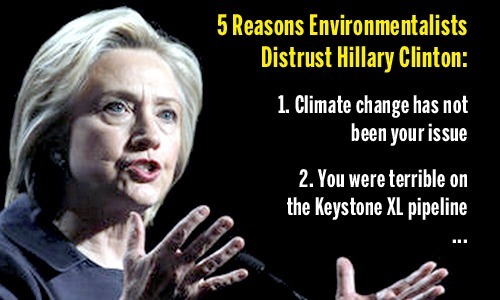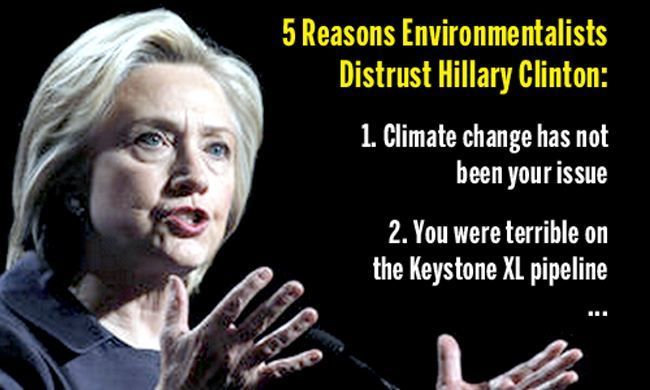


In your husband’s years in office, the greenhouse effect was still fairly novel science; even eight years ago, when you were first running for president, climate change was not yet really a top-tier issue. In a sense, then, this summer marks the first chance most Americans have to really find out what and how you think about global warming—the challenge that more than any other will color the economic and foreign policy landscape for the years ahead. In hopes you might seize the moment, I offer a few suggestions.

So far your rhetoric has been correct but eye-glazing, dominated by phrases like “urgent” and “moral” and “grandchildren”—the words skillful politicians use to signal interest without committing themselves to actual policies. (Because policies come with opponents.)
But that rhetorical luxury will soon disappear. There’s a mature climate movement, big enough, like the immigration movement, to demand answers. Oh, and 2015 looks like it will replace 2014 as the hottest year ever recorded; the U.S. has just come through the rainiest month since we began keeping track; our biggest state is mired in its deepest drought. Mother Nature may not have a super PAC, but she has her own ways of focusing attention.
In the end, if you’re the Democratic candidate in the general election, environmentalists may vote for you no matter what, on the general theory of: Republicans don’t believe in physics. But that’s different from building the kind of enthusiasm that makes elections easier to win, an enthusiasm that would be essential if you actually planned to change things once taking office.
So with that in mind, it’s worth thinking about why many serious environmentalists currently distrust you, what it would take at a minimum to build trust, and what might ignite deep support.
Five reasons environmentalists distrust you
The mistrust comes from several directions:
- Climate change has not been your issue. You’ve focused your greatest attention on issues you came to early in life—things like education and health care—all of which are crucial. But climate change feels like a late add-on. You know the topic because you’re whip-smart, but only as a topic; if you really felt it, then the obvious connections with the things you do care about would be apparent. One sees a glimmer of it sometimes: the campaign for better cookstoves in developing nations combines all your deepest cares with important environmental issues. But you could go much deeper. Study after study shows that climate change is hitting vulnerable communities the hardest—just look at asthma rates in the U.S. and superimpose that on a map of where the coal plants are.
- You were terrible on Keystone. Even before the State Department began its review of the project, you said you were “inclined” to approve it. That’s been your last public word on the project, but your team performed an intellectually corrupt review of the plans, your campaign bundlers landed rich lobbying contracts, and your former advisers took jobs with Transcanada.It was and is a huge mess—and I’m sure you hate the whole topic because at the start you couldn’t have known that it would become the iconic environmental issue of our era. Since pipelines until Keystone were routinely approved, it probably seemed like just a chance to please the Canadians. Had you known it would become a hornet’s nest, you would doubtless have proceeded more carefully—and in fairness it wasn’t until the process was underway that climate scientists raised their most forceful concerns. Still, ugh.
- You took the Obama administration’s affection for fracking and ran with it. Working with a deep team of oil company advisers, you set up a whole office at the State Department whose job it was to push fracking all over the world (Cambodia, China, New Guinea); you gave speech after speech in country after country. This was bad policy in the extreme: America, at best, struggles to keep fracking from poisoning its water, and even with our regulations on drilling, massive quantities of methane leak out. So now imagine how well it’s going to work in, say, Romania, where your ambassador pressured the government to turn over millions of acres for shale gas development (before returning to work for Chevron’s law firm).
- As the world’s top diplomat, you presided over the monumental failure that was the Copenhagen climate conference in 2009. Six crucial years were lost as a result. Enough said.
- All that endless money. The right-wing attacks on the endless speaking fees and foundation gifts aren’t actually just a concern to the right wing. The banks backing Keystone, just to give one small example, have been regular and enormous patrons. It’s not illegal, any of it, and it’s not quite the same as the way the Koch brothers simply purchased the GOP, but it’s not far enough away, either. Influence is … influence.
Seven ways you could win some green stripes
So given that dreary backdrop, what’s the minimum bar for being taken seriously? It’s clearly not enough any more to say that “climate science is real,” and we take it for granted that you’ll back the Obama administration’s initiatives on things like coal-fired power plants. But climate is a moving target: The science has gotten steadily darker, and we’ve seen all the places where Obama’s policy turned out to be a sham. So:

 233k
233k  41k
41k  Subscribe
Subscribe 